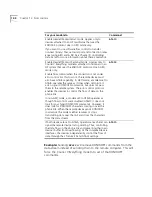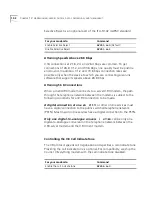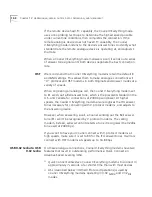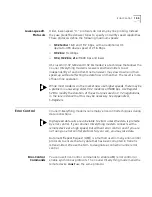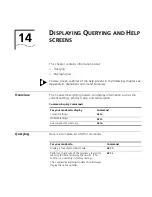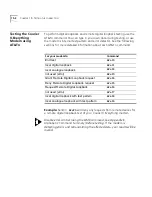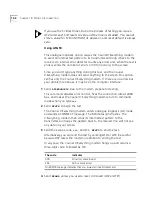
13-10
C
HAPTER
13: H
ANDSHAKING
,
ERROR
CONTROL
,
DATA
COMPRESSION
,
AND
THROUGHPUT
Installations with specialised software may want to enable a fixed
serial port rate for ARQ calls and a variable serial port rate for
non-ARQ calls. See the &B2 command in Appendix B, Alphabetic
Command Summary.
■
The call is under data compression.
■
The data is made up of text files rather than binary files such as .EXE
or .ZIP files
■
MNP5 compression is disabled for files that are already compressed,
and 8-bit binary files that appear to modems to be already
compressed. Disable MNP5 compressing by sending the Courier
V.Everything modem AT&K3.
■
The file transfer is not slowed down by a file-transfer protocol. Many
non-text files require a file transfer protocol, but the results vary.
For the best throughput on error-controlled connections only and with
hardware flow control we recommend the most current version of
ZMODEM file transfer protocol.
For example, certain public domain file transfer protocols have the
following effects:
The protocols listed above further reduce throughput when an error
control connection is established. The accuracy of the data is checke
both by the file transfer protocol and the Courier V.Everything
modem. To avoid redundancy, use the above protocols only for
non-ARQ connections, and only at speeds of 2400 bps and below.
Public Domain
Effects
Kermit
Newer versions support packets up to 9K and a sliding
window design to eliminate turnaround delay. With earlier
versions, however, throughput may be severely reduced
due to short block lengths (possibly under 128 bytes) and
acknowledgment turnaround time.
XMODEM
Throughput may be reduced if your version uses short
block lengths (128 bytes). Some versions use larger blocks
(1K blocks). Throughput is also reduced by overhead (error
control protocol information).
YMODEM
There is an improvement over XMODEM, due to larger
block lengths (1K bytes), but throughput is still reduced by
the protocol's error control overhead.
Summary of Contents for Courier
Page 12: ......
Page 28: ...1 14 CHAPTER 1 CONNECTING TO YOUR ISP ...
Page 36: ...3 4 CHAPTER 3 UPGRADING YOUR MODEM ...
Page 58: ...6 6 CHAPTER 6 WORKING WITH MEMORY ...
Page 64: ...8 4 CHAPTER 8 CONTROLLING EIA 232 SIGNALING ...
Page 72: ...9 8 CHAPTER 9 ACCESSING AND CONFIGURING THE COURIER V EVERYTHING MODEM REMOTELY ...
Page 80: ...10 8 CHAPTER 10 CONTROLLING DATA RATES ...
Page 96: ...12 6 CHAPTER 12 FLOW CONTROL ...
Page 108: ...13 12 CHAPTER 13 HANDSHAKING ERROR CONTROL DATA COMPRESSION AND THROUGHPUT ...
Page 112: ...14 4 CHAPTER 14 DISPLAYING QUERYING AND HELP SCREENS ...
Page 122: ...15 10 CHAPTER 15 TESTING THE CONNECTION ...
Page 142: ...17 8 CHAPTER 17 TROUBLESHOOTING ...
Page 156: ...A 14 APPENDIX A S REGISTERS ...
Page 172: ...B 16 APPENDIX B ALPHABETIC COMMAND SUMMARY ...
Page 178: ...C 6 APPENDIX C FLOW CONTROL TEMPLATE ...
Page 186: ...E 4 APPENDIX E V 25 BIS REFERENCE ...



